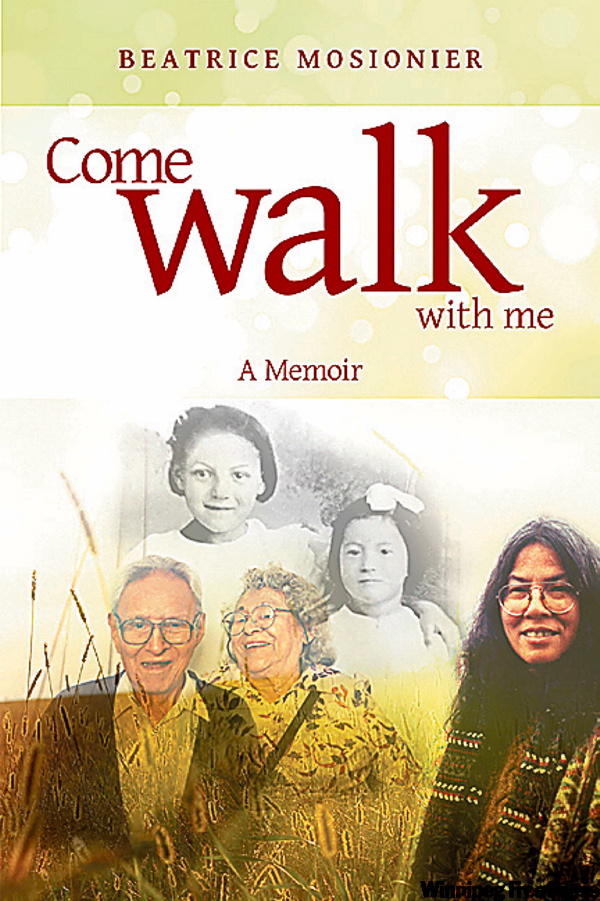Mosionier details experiences in plainspoken memoir
Advertisement
Read this article for free:
or
Already have an account? Log in here »
To continue reading, please subscribe:
Monthly Digital Subscription
$1 per week for 24 weeks*
- Enjoy unlimited reading on winnipegfreepress.com
- Read the E-Edition, our digital replica newspaper
- Access News Break, our award-winning app
- Play interactive puzzles
*Billed as $4.00 plus GST every four weeks. After 24 weeks, price increases to the regular rate of $19.00 plus GST every four weeks. Offer available to new and qualified returning subscribers only. Cancel any time.
Monthly Digital Subscription
$4.75/week*
- Enjoy unlimited reading on winnipegfreepress.com
- Read the E-Edition, our digital replica newspaper
- Access News Break, our award-winning app
- Play interactive puzzles
*Billed as $19 plus GST every four weeks. Cancel any time.
To continue reading, please subscribe:
Add Free Press access to your Brandon Sun subscription for only an additional
$1 for the first 4 weeks*
*Your next subscription payment will increase by $1.00 and you will be charged $16.99 plus GST for four weeks. After four weeks, your payment will increase to $23.99 plus GST every four weeks.
Read unlimited articles for free today:
or
Already have an account? Log in here »
Hey there, time traveller!
This article was published 31/10/2009 (5830 days ago), so information in it may no longer be current.
Come Walk With Me
By Beatrice Mosionier
High Water Press, 186 pages, $19

What really happened to Manitoba Métis writer Beatrice Culleton Mosionier to inspire her poignant novels In Search of April Raintree and In the Shadow of Evil, plus a play and aboriginal children’s books?
How much was fiction, and how much her own real experience? The actual details of Mosionier’s family of origin, molestation, foster family life, rape and difficult romantic life finally come to light in her plainspoken memoir Come Walk With Me.
Though she has changed some of the names in this book, she intersperses transcripts of her mother Mary Clara Pelletier Mosionier’s voice on tapes talking about her own painful history.
Mosionier first heard these tapes in 2001. Reunited with her daughter in later years, Clara tells about one of the times she and her husband tried to get their kids back, and heard everyone in the courtroom speaking out against them: "If I had a gun, I would have shot them all. Every last one of them."
Who knew her mother cared so much, after she stopped coming with her husband for visits? That night when she parts from her mother, Mosionier recalls, "We hug for a long time and I feel my mother’s wet cheek against my face. I try to make her feel all the love and compassion I had withheld so long."
As a tiny child, dark-skinned Beatrice was taken from her parents and placed in the foster child system, mainly with a white family in St. Norbert.
As they grew up, her two sisters, Vivian and Kathy, were on two separate paths to destruction. Mosionier’s groundbreaking novel April Raintree (1983) was written after both sisters had committed suicide.
The second, In the Shadow of Evil ( 2000), was motivated by Mosionier’s molestation at age three by a priest, an experience that still haunted her.
The 25th anniversary edition of In Search of April Raintree (2008), containing a grouping of critical essays, will help sell this memoir, which is illuminating though very simply set down.
While the memoir explains the motivation and powerful detail used in her major works of fiction, it’s missing most of the last eight years, and that’s a real disappointment.
Readers become attached to Mosionier — she’s a lovable person — and will want to read about the most recent decade in Winnipeg, where we are led to guess she’s found contentment.
Old fans of Mosionier’s novel writing style will be glad to know her delightful child’s voice is alive and clear and sweet coming off the page, telling the colourful details of her life as a brown-skinned obviously Indian (her word) foster child, particularly during the 10 years living in St. Norbert, south of Winnipeg.
The memoir is full of questions and musings about her complicated life from this bright, observant, but very shy child. As she gains understanding and maturity, the voice changes, too. But this story never turns into another one of her novels; don’t expect it.

As she moves past her difficult foster child years, the memoir loses tension. Romantic interest picks up with the story of her relationship with Sonny Bono look-alike Bill Culleton, the father of her two children and her first husband.
Bill kept disappearing, and reappearing (and cheating) until she finally refound George Moehring in the late ’80s, a man she knew from her George Brown College days in Toronto.
A mature and happy love relationship blooms. Mosionier leaves Bill for the last time, joins George in Ontario, and later marries him.
There’s nothing much shared about the second marriage, except a few lines, and photos of them travelling on the North Sea near Cuxhaven, Germany, where he used to go to camp as a boy.
We don’t find out how her grown children are doing either, and inquiring minds want to know!
In the final pages of Come Walk With Me, Mosionier just sets down the history of what happened after April Raintree was released and tells of the many aboriginal causes people asked her to take on.
The saving grace in her whole life, she reflects towards the end of her memoir, was her rejection of alcohol, even when things were truly bad — a lesson for everybody. Today author Beatrice Mosionier lives in Manitoba, always her home province.
Winnipegger Maureen Scurfield writes the Miss Lonelyhearts advice column for the Free Press.
Our newsroom depends on a growing audience of readers to power our journalism. If you are not a paid reader, please consider becoming a subscriber.
Our newsroom depends on its audience of readers to power our journalism. Thank you for your support.


